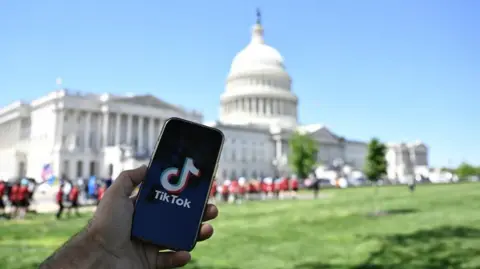Sci-Tech
TikTok confirms it offered US government a ‘kill switch’

By Imran Rahman-Jones, Technology reporter
 Getty Images
Getty ImagesTikTok says it offered the US government the power to shut the platform down in an attempt to address lawmakers’ data protection and national security concerns.
It disclosed the “kill switch” offer, which it made in 2022, as it began its legal fight against legislation that will ban the app in America unless Chinese parent company ByteDance sells it.
The law has been introduced because of concerns TikTok might share US user data with the Chinese government – claims it and ByteDance have always denied.
TikTok and ByteDance are urging the courts to strike the legislation down.
“This law is a radical departure from this country’s tradition of championing an open Internet, and sets a dangerous precedent allowing the political branches to target a disfavored speech platform and force it to sell or be shut down,” they argued in their legal submission.
They also claimed the US government refused to engage in any serious settlement talks after 2022, and pointed to the “kill switch” offer as evidence of the lengths they had been prepared to go.
TikTok says the mechanism would have allowed the government the “explicit authority to suspend the platform in the United States at the US government’s sole discretion” if it did not follow certain rules.
A draft “National Security Agreement”, proposed by TikTok in August 2022, would have seen the company having to follow rules such as properly funding its data protection units and making sure that ByteDance did not have access to US users’ data.
The “kill switch” could have been triggered by the government if it broke this agreement, it claimed.
In a letter – first reported by the Washington Post – addressed to the US Department of Justice, TikTok’s lawyer alleges that the government “ceased any substantive negotiations” after the proposal of the new rules.
The letter, dated 1 April 2024, says the US government ignored requests to meet for further negotiations.
It also alleges the government did not respond to TikTok’s invitation to “visit and inspect its Dedicated Transparency Center in Maryland”.
The US Court of Appeals for the District of Columbia will hold oral arguments on lawsuits filed by TikTok and ByteDance, along with TikTok users, in September.
Legislation signed in April by President Joe Biden gives ByteDance until January next year to divest TikTok’s US assets or face a ban.
It was born of concerns that data belonging to the platform’s 170 million US users could be passed on to the Chinese government.
TikTok denies that it shares foreign users’ data with China and called the legislation an “unconstitutional ban” and affront to the US right to free speech.
It insists that US data does not leave the country, and is overseen by American company Oracle, in a deal which is called Project Texas.
However, a Wall Street Journal investigation in January 2024 found that some data was still being shared between TikTok in the US and ByteDance in China.
In May, a US government official told the Washington Post that “the solution proposed by the parties at the time would be insufficient to address the serious national security risks presented.”
They added: “While we have consistently engaged with the company about our concerns and potential solutions, it became clear that divestment from its foreign ownership was and remains necessary.”
Sci-Tech
Are rainy days ahead for cloud computing?

By Sean McManus, Technology reporter
 David Heinemeier Hansson
David Heinemeier HanssonThis year, software firm 37signals will see a profit boost of more than $1m (£790,000) from leaving the cloud.
“To be able to get that with such relatively modest changes to our business is astounding,” says co-owner and chief technology officer, David Heinemeier Hansson.
The US company has millions of users for its online project management and productivity software, including Basecamp and Hey.
Like many companies it outsourced data storage and computing to a third party firm, a so-called cloud services provider.
They own huge data centres, where they host data from other firms, which can be accessed over the internet.
In 2022, such services cost 37signals $3.2m.
“Seeing the bill on a weekly basis really radicalised me,” Mr Heinemeier Hansson says.
“I went: ‘Wait! What are we spending for a week of rentals?’ I could buy some really powerful computers just on one week’s worth of [cloud] spending.”
So, he did. Buying hardware and hosting it in a shared data centre costs $840,000 per year.
Although costs pushed Mr Heinemeier Hansson to act, other factors were also a concern.
The internet is engineered to be highly resilient.
“I saw the distributed design erode as more and more companies gravitated essentially to three owners of computers,” he says, referring to the three leading cloud providers.
If a major data centre goes down, large parts of the web can go offline.
The cloud was pitched, he says, as cheaper, easier, and faster. “The cloud was not able to make things easier to a point where we could measure any productivity gains,” he says, noting his operations team has always been about the same size.
Was using the cloud faster?
“Yes, but it didn’t matter,” says Mr Heinemeier Hansson.
“If you want to connect a hundred servers to the internet, you can do it in less than five minutes [in the cloud]. That’s incredible.
“But we do not need, nor do I believe the vast majority of companies need, a five-minute turnaround on a massive number of additional servers.”
He can have new servers delivered and racked in his data centre in a week, which is fast enough.
37signals does use the cloud for experimenting with new products. “We needed to have some big machines, but we only needed them for 20 minutes,” Mr Heinemeier Hansson says.
“The cloud is ideal for that. It would be wasteful to buy that computer and let it stay idle for 99.99% of the time.”
He still recommends the cloud to fledgling businesses. “When you have a speculative start-up and there’s great uncertainty as to whether you’re going to be around in 18 months, you should absolutely not spend your money buying computers,” he says. “You should rent them.”
 Getty Images
Getty Images37signals is not alone in bringing workloads back from the cloud, which is known as cloud repatriation.
Digital workspace company Citrix found that 94% of large US organisations it surveyed had worked on repatriating data or workloads from the cloud in the last three years.
The reasons cited included security concerns, unexpected costs, performance issues, compatibility problems and service downtime.
Plitch provides software that enables people to modify single-player games, including adjusting the difficulty.
It built its own private data centres and repatriated cloud workloads to them, saving an estimated 30% to 40% in costs after two years.
“A key factor in our decision was that we have highly proprietary R&D data and code that must remain strictly secure,” says Markus Schaal, managing director at the German firm.
“If our investments in features, patches, and games were leaked, it would be an advantage to our competitors. While the public cloud offers security features, we ultimately determined we needed outright control over our sensitive intellectual property.
“As our AI-assisted modelling tools advanced, we also required significantly more processing power that the cloud could not meet within budget.”
He adds: “We encountered occasional performance issues during heavy usage periods and limited customisation options through the cloud interface. Transitioning to a privately-owned infrastructure gave us full control over hardware purchasing, software installation, and networking optimized for our workloads.”
 Pulsant
PulsantMark Turner, chief commercial officer at Pulsant, helps companies to migrate from the cloud to Pulsant’s colocation data centres across the UK.
In a colocation arrangement the client owns the IT hardware, but houses it with another firm, where it can be kept securely, at the right temperature and with power back-up.
“The cloud is going to continue to be the biggest part of IT infrastructure, but there is a good place for local, physical, secure infrastructure,” he says. “There is a repatriation going on of the things that should never have been in the cloud or that won’t work in the cloud.”
Some his biggest clients for repatriation are online software providers, where each additional customer puts more load on the server, increasing cloud costs.
One such client is LinkPool, which enables smart contracting using blockchain. It was developed in public cloud, initially using free credits. Business exploded, and the cloud bill reached $1m per month. Using colocation, costs shrunk by up to 85%.
“[The founder has] now got four racks in a data centre in the city where he lives and works, connected to the world. He goes up against his competitors and he can move his price point around because his cost is not going to move in line [with customer demand],” says Mr Turner.
“The change leaders in the IT industry are now the people who are not saying cloud first, but are saying cloud when it fits,” he adds. “Five years ago, the change disruptors were cloud first, cloud first, cloud first.”
Of course, not everyone is repatriating. Cloud computing will remain an enormous business, with AWS, Microsoft’s Azure and Google Cloud Platform being the biggest players.
For firms like Expedia, they are essential.
It has used the cloud to consolidate 70 petabytes of travel data from its 21 brands.
Applications run in the cloud, too, except for legacy software that doesn’t work there yet.
“We are experts in travel,” says Rajesh Naidu, chief architect and senior vice president, Expedia. “[Cloud providers] are experts in running infrastructure. That’s one less thing for me to worry about while we focus on running our business.”
“One of the main things the cloud gives us is a global presence, the ability to deploy our solutions closer to the region that they need to be in,” he says.
“The other thing is the resiliency and the availability of the infrastructure. Cloud providers have designed and architected their infrastructure really well. We can ride on the coattails of their innovation.”
Expedia has a cloud centre of excellence, which saved about 10% on cloud costs last year.
“You’ve got to set policies because otherwise it’s easy for companies to run huge cloud costs,” Mr Naidu says. “You can turn things down when you don’t need them. If you consume [cloud resources] wisely, your bill won’t be a surprise at the end of the day.”
Sci-Tech
AT&T, Verizon and T-Mobile Users Hit by Service Outage in Europe

Many travelers from the United States lost a crucial tool to check maps, make reservations, use ride-hailing apps and more because of a cellular data outage that began affecting users of AT&T, T-Mobile and Verizon on Wednesday.
The affected travelers, mostly in Europe, posted on social media, seeking answers about what caused the outage and how long it would last. Some reported being unable to make phone calls, send texts or use online services without Wi-Fi for as long as 24 hours. It is unclear what caused the outage, which appeared to extend from Britain to Turkey.
An AT&T spokeswoman said that the carrier’s network was operating normally, but that some customers traveling internationally might be experiencing service disruptions because of an issue outside the AT&T network. The company said it was working with one of its roaming connectivity providers to resolve the issue.
Verizon told some of its customers on social media that it was also aware of the issue and that its teams were working with local providers to resolve it.
A T-Mobile representative said the carrier was one of “several providers impacted by a third-party vendor’s issue that is intermittently affecting some international roaming service” and was also working to resolve it.
George Lagos, a 70-year-old real estate developer from Dunedin, Fla., who is visiting the Greek island of Crete with his family, noticed yesterday that his T-Mobile cellular data was not working. For about 24 hours, he said, he was not able to reach the people he had made plans with, though luckily, they had already gone over the details together.
“You know it’s an inconvenience, but it wasn’t a disaster,” said Mr. Lagos, whose service appeared to be restored by Thursday evening. “I didn’t miss a flight. I didn’t have a taxicab looking for me or anything.”
But there was a more serious concern: His wife’s mother has been sick and Mr. Lagos’s wife could not reach the person who was helping take care of her.
“That probably was the worst thing,” Mr. Lagos said.
Major U.S. carriers all offer some version of an all-inclusive international data plan that allows travelers to use their phones much as they would in the United States.
Though the current disruption appears to be easing, travelers affected by such outages have other options to connect. Swapping out a physical SIM card — for phones that still have one — can allow you to connect to a local network. (These typically come in pay-as-you-go or prepaid packages.) For newer phones, apps like Airalo provide relatively inexpensive electronic SIM card packages in many international destinations. And of course, you can always seek out a secure Wi-Fi network.
Follow New York Times Travel on Instagram and sign up for our weekly Travel Dispatch newsletter to get expert tips on traveling smarter and inspiration for your next vacation. Dreaming up a future getaway or just armchair traveling? Check out our 52 Places to Go in 2024.
Sci-Tech
India seeks report on hiring practices of Apple supplier

The Indian government has sought a detailed report from Tamil Nadu state following media reports that Apple supplier Foxconn was allegedly rejecting married women for iPhone assembly jobs.
A Reuters investigation alleged that Foxconn had excluded married women from jobs at its main India iPhone plant near Chennai, citing their greater family responsibilities compared to unmarried women.
The federal labour ministry says the law “clearly stipulates that no discrimination (is) to be made while recruiting men and women workers”.
Neither Apple nor the Tamil Nadu state government responded to requests for comment from Reuters.
The BBC has also reached out to Foxconn and the Tamil Nadu labour department for a response.
Foxconn, the largest supplier of Apple iPhones, set up its first factory in Tamil Nadu in 2017 but has since been aggressively expanding its operations in India.
In 2023, it began assembling the iPhone 15 in the state and earlier this year, Foxconn tied up with Google to make Pixel smartphones in Tamil Nadu.
Rights activists say the reports about the firm’s hiring practices in India are concerning, given that thousands look to its factories for employment opportunities.
Reuters said it spoke to numerous employees and Foxconn hiring agencies for the story.
The report said that hiring agents and Foxconn HR sources “cited family duties, pregnancy and higher absenteeism as reasons why Foxconn did not hire married women at the plant”.
This isn’t the first time the firm has come under the scanner for its labour practices.
In 2018, a US-based rights group had accused the firm of overworking and underpaying temporary workers at its factory in China that manufactured products for Amazon.
In 2022, its iPhone factory in China saw protests by workers who claimed that they had not been paid certain dues.
-

 African History5 years ago
African History5 years agoA Closer Look: Afro-Mexicans 🇲🇽
-

 African History5 months ago
African History5 months agoBlack History Facts I had to Learn on My Own pt.6 📜
-

 African History5 years ago
African History5 years agoA Closer Look: Afro-Mexicans 🇲🇽
-

 African History1 year ago
African History1 year agoMajor African Tribes taken away during the Atlantic Slave Trade🌍 #slavetrade #africanamericanhistory
-

 African History1 year ago
African History1 year agoCameroon 🇨🇲 World Cup History (1962-2022) #football #realmadrid #shorts
-

 African History1 year ago
African History1 year agoPROOF AFRICAN AMERICANS AIN'T FROM AFRICA DOCUMENTED EVIDENCE
-

 African History4 months ago
African History4 months agoMr Incredible Becoming Canny/Uncanny Mapping (You live in Paraguay 🇵🇾)
-

 African History5 months ago
African History5 months agoBlack History Inventors: Mary Kenner 🩸

























